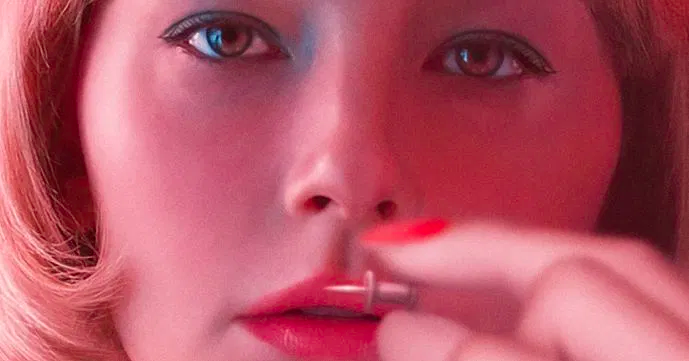Why the Movie ‘Swallow’ Might Make You Feel Nauseated

Lately, it feels like every movie has us thinking, “What the fuck did I just watch?” In this series, we will break down exactly what happened in all those wild, mind-bendy, and just plain strange flicks...in a way that’s much easier to understand than the actual film.
This post contains spoilers for Swallow.
When I stepped into the movie theater to watch the new film Swallow, I was anticipating the story of a woman struggling with pica, a real medical disorder in which a person has a compulsion to eat non-food items. What I got instead was a movie that tried to do that and so much more...to varying degrees of success. Carlo Mirabella-Davis’s debut film starts with good intentions but takes one too many turns to make logical sense. Let’s get into it.
The movie revolves around Hunter, played by Haley Bennett, who lives a seemingly perfect life: She has a wealthy, handsome husband, Richie (Austin Stowell), they share a stunning house in upstate New York, and her bob is flawlessly coiffed at all times. Richie is taking over the family biz (I’m still a little unclear as to what that is), and soft-spoken Hunter, the stereotypical doting housewife, announces she’s pregnant. He’s happier about it than she is.
That’s when she starts to show signs of pica. According to the National Eating Disorders Association, it’s unclear how many people suffer from pica, but it’s more common in pregnant women. Hunter’s disorder starts with her eating ice cubes at a dinner, and it escalates to marbles, batteries, and other small knickknacks. She fishes items out of the toilet after she eats them and lays them on a display table as trophies of sorts. Her “collection” builds, and eventually, her disorder lands her in an operating room, when her husband and in-laws become aware of her compulsion.
When she’s back from the hospital, the family hires a live-in nurse to keep an eye on her during the day. She is forced to see a therapist and reveals that swallowing these things makes her feel “in control.” The theme of women’s bodily autonomy is a bit overexplained here, with the parallel between her pica providing a sense of control and the idea that her pregnancy is a way for her to fulfill her duty to Richie.
This movie starts out following Hunter’s struggle with this relatively uncommon eating disorder, but the plot takes some turns. Eventually, Hunter reveals in therapy that she was conceived through rape. In this context, the revelation feels like a plot device that’s being used to give the character “depth” when the character is already plenty layered. The film tries to use Hunter’s past as an explanation for her pica, but the audience was already given a reason: She wants to make her husband happy, but she feels trapped in her situation and swallowing non-food items gives her some semblance of control. Rape is used here as a plot twist, which feels contrived, especially coming from a male writer/director.
After the point when she reveals that bit of information, her struggle with pica becomes less of a central issue and turns into a “woman-on-the-run” scenario. She’s given an ultimatum by her husband and in-laws: She can either stay in a psychiatric facility until the baby is born, or Richie will divorce her. Again, any one of these things on its own wouldn’t be a big deal, but cramming them all together feels like a lot.

The movie then takes an even more bizarre turn when Hunter seeks out her biological father, the man who raped her mother. Why? Who knows! The encounter convinces her to terminate her pregnancy. In the final scene, she’s in a bathroom and you catch sight of a bloody toilet bowl. The filmmakers seem to want audiences to think the last thing she swallows frees her both physically and mentally from the baby, but it just raises more questions.
The idea of Hunter’s control (and sometimes lack thereof) over her own body is central to this film. But by incorporating too many plot points related to that idea, the film seems to be telling you what it wants you to feel instead of just letting you feel it.
You Might Also Like

